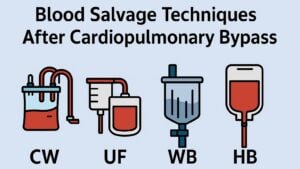The study, Limiting the Gamble: Risk and Predictability for Renal Replacement Therapy in Patients Receiving Mechanical Circulatory Support, explores the factors that contribute to the necessity of renal replacement therapy (RRT) in patients undergoing mechanical circulatory support (MCS). Given the high risk of acute kidney injury (AKI) in this patient population, identifying risk factors for RRT is essential to improving outcomes and optimizing treatment strategies.
Patients experiencing cardiogenic shock often suffer from significant end-organ hypoperfusion. While initial treatments include vasoactive medications, coronary interventions, and mechanical ventilation, those who continue to deteriorate may require MCS. This life-saving therapy helps restore circulation but carries the risk of reperfusion injury, a condition that occurs when oxygen and nutrients are suddenly reintroduced to tissues that had previously been deprived. This process triggers the release of reactive oxygen and nitrogen species, cytokines, and other inflammatory mediators that may cause additional organ damage. One of the most vulnerable organs in this context is the kidney, with AKI frequently leading to the need for RRT. However, the precise mechanisms and risk factors that contribute to the development of severe renal dysfunction in MCS patients are not well understood.
To better understand these risks, the study conducted a retrospective analysis of 129 patients treated at Ochsner Health between January 2017 and October 2023. By applying machine learning techniques, the researchers analyzed patient characteristics, comorbidities, and the incidence of RRT to determine predictive factors. The statistical modeling used included decision-tree analysis, logistic regression, and neural support vector machines, allowing for a comprehensive assessment of the variables influencing the need for RRT.
The results revealed that 36% of the patients required RRT, with a 95% confidence interval of 29% to 44%. Among patients who required RRT, the hospital mortality rate was significantly higher, reaching 79%, compared to 35.3% for those who did not need RRT. This underscores the severe implications of renal failure in MCS patients. Through machine learning analysis, the study identified two novel risk factors: prior immunologic therapy and the presence of a pacemaker or internal cardiac defibrillator (ICD). Patients who had received immunologic therapy exhibited a 48% incidence of RRT, while those with pacemakers or ICDs had a 47% incidence. Notably, when both risk factors were present, the likelihood of requiring RRT increased to 66%, suggesting a strong link between these conditions and renal dysfunction during MCS.
The identification of these risk factors points to the role of systemic inflammation in the pathophysiology of AKI in MCS patients. Immunologic therapies, commonly used for autoimmune diseases or transplant management, are known to modulate the immune response and may contribute to a chronic pro-inflammatory state. Similarly, implantable cardiac devices have been associated with immune activation and inflammatory responses. This heightened systemic inflammation could exacerbate kidney injury when patients undergo MCS, increasing their likelihood of needing RRT.
Another critical aspect of the study was the examination of anticoagulation therapy in MCS patients, particularly its relationship to RRT incidence. Unfractionated heparin (UFH) was the most commonly used anticoagulant in the study population. However, patients who received UFH had a 43% incidence of RRT, suggesting that it provided minimal protection against renal failure. In contrast, patients who received low molecular weight heparin (LMWH) had significantly lower RRT rates, though the sample size for LMWH users was small. Additionally, among the four patients who did not receive any anticoagulation therapy, all required RRT, indicating the critical role of anticoagulation management in preventing renal complications.
The findings suggest that UFH may not be the ideal anticoagulant for MCS patients at high risk for RRT. While UFH is widely used due to its historical effectiveness in cardiopulmonary bypass procedures, its long-term administration can lead to complications such as heparin-induced thrombocytopenia (HIT) and immune-mediated platelet activation. Moreover, UFH’s potential to contribute to inflammatory responses could further exacerbate kidney injury in vulnerable patients. Given these concerns, alternative anticoagulation strategies, such as LMWH or novel anticoagulants, should be explored to improve patient outcomes.
The study’s discussion emphasizes the growing role of MCS in critical care and the need for a better understanding of its complications. While MCS is a powerful tool for stabilizing patients with severe cardiac failure, it is not without risks. The research highlights how systemic inflammation, whether from pre-existing conditions or therapeutic interventions, can significantly influence outcomes. Identifying patients at higher risk for RRT allows for early intervention strategies, potentially improving survival rates. One proposed approach is closer monitoring and personalized anticoagulation regimens tailored to a patient’s inflammatory and renal risk profile.
Despite its significant findings, the study acknowledges certain limitations. As a retrospective analysis, it is subject to potential biases related to incomplete medical records and confounding variables. However, the near-complete data collection due to electronic medical records enhances the study’s reliability. Additionally, the use of machine learning allows for sophisticated adjustments that account for multiple confounding factors, improving the robustness of the results. Another limitation is the relatively small sample size, which may restrict the generalizability of the findings. Larger, prospective studies are needed to validate these associations and refine predictive models.
In conclusion, the study underscores the high incidence of RRT among MCS patients and identifies novel risk factors that could inform future clinical decision-making. The association between systemic inflammation and renal failure highlights the need for personalized risk assessment in MCS patients. Furthermore, the findings suggest that traditional anticoagulation strategies, particularly the widespread use of UFH, may not be the best option for all patients. Given the lack of significant protective effects observed in this study, alternative anticoagulation methods should be considered, and future research should explore their efficacy in reducing RRT dependency.
This research contributes valuable insights into the interplay between cardiovascular support, renal function, and systemic inflammation. By identifying specific risk factors and questioning established anticoagulation practices, the study opens the door for further investigation into optimized treatment strategies. As MCS continues to be a cornerstone of critical care, understanding and mitigating its complications will be crucial for improving patient survival and quality of life.
Study Ranking = 4.5 (High-Quality Retrospective Study) This study uses robust machine learning techniques to analyze risk factors in a well-defined patient population. While retrospective in nature, its comprehensive data collection and novel findings provide valuable insights. However, further prospective validation is needed to confirm its conclusions.







